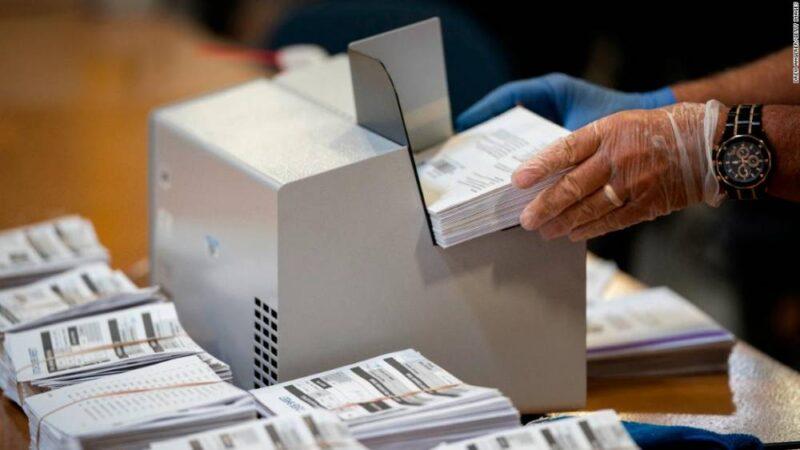A version of this story first appeared in CNN Business’ Before the Bell newsletter. Not a subscriber? You can sign up right here.
London (CNN Business)You’d expect the biggest US banks to be having a tough time right now.
Interest rates are at historic lows, hurting their ability to make money off lending. Americans and many companies are strapped for cash, raising the prospect of big loan losses. And the economic outlook remains hugely uncertain.But JPMorgan Chase (JPM), the largest US lender, just reported $9.4 billion in profit between July and September, up 4% from the year before — blowing Wall Street analysts’ expectations out of the water.
What happened? For starters, JPMorgan is benefiting from a big market boom that’s encouraged companies to sell debt and equity and consider mergers.Profits surged 52% to $4.3 billion last quarter at JPMorgan’s corporate and investment bank. Investment banking revenue climbed 12% as a flurry of IPOs and bond sales drove up equity and debt underwriting fees.Read MoreThe picture from Main Street was a bit more muddled. While revenue from mortgages jumped as Americans rushed to take advantage of low interest rates, people are spending less on credit cards — and the bank continues to worry about the economic situation.”There’s still a lot of uncertainty,” JPMorgan Chief Financial Officer Jennifer Piepszak told journalists during a conference call. “We still have 12 million people unemployed.”Citi (C) also reported Tuesday that its trading and investment banking revenue rose, helping the bank bring in $3.2 billion in profits. Unlike JPMorgan, that’s down a massive 34% compared to last year — though it is still notable that Wall Street’s top players can make money in the current environment.Investor insight: Banks are making it through, but their stocks are taking a beating. Shares of JPMorgan Chase are down 28% this year, while Citi is off 45%.Watch this space: JPMorgan opted not to build its cushion to guard against loan losses. That’s a good sign, signifying that it believes it’s adequately prepared for what comes next.But CEO Jamie Dimon said that a “decent stimulus package would be helpful,” and lower the chances of a painful double-dip recession.This just in: Count Goldman Sachs among the banks making tons of money thanks to market gains. The investment bank said Wednesday that its profit nearly doubled last quarter to $3.6 billion.
These companies are still burning cash
The companies that have been hammered hard by the coronavirus pandemic are still burning cash after months of strain — and some warn that they can’t keep it up for much longer.The latest: AMC Theatres, the world’s largest movie theater chain, could run out of money by the end of the year, my CNN Business colleague Frank Pallotta reports.The company said this week that its cash resources would be “largely depleted” by the end of 2020 or early 2021. It blamed the “reduced movie slate for the fourth quarter,” as well as “the absence of significant increases in attendance from current levels.”AMC said there are just two ways out of the crisis: Either more customers start buying tickets, or it needs to find new ways to raise money. Both options pose problems. Option 1: AMC had reopened 494 of its nearly 600 US theaters at a limited seating capacity as of October 9. But people are still hesitant to go watch films. Attendance at US theaters is down 85% compared to last year.Option 2: The company is exploring additional debt financing, renegotiations with landlords and even potential asset sales. However, AMC warned of “significant risk that these potential sources of liquidity will not be realized or that they will be insufficient” to generate the cash necessary to make it through.Delta Air Lines (DAL) is also losing millions every day as travel stays depressed. While it’s in better shape than AMC, the carrier told investors on Tuesday that it will likely be burning through $10 million to $12 million per day at year’s end. The company expects to be spending more cash than it brings in until spring 2021.Investor insight: Shares of AMC Entertainment (AMC) plunged 13% on Tuesday, while Delta’s stock fell 2.7%.
Contested election could cost America its AAA credit rating
A messy election could harm more than just faith in democracy — it could also cost the United States its perfect credit rating from Fitch Ratings, my CNN Business colleague Matt Egan reports.

A contested election could cost America its AAA credit ratingFitch wrote in a report this week that it will closely monitor the US presidential election for “any departure” from America’s history of orderly transfers of power.The United States has a pristine AAA credit rating from Fitch in part because of its track record for strong governance, including “well-understood rules and processes for the transfer of power,” the report said.”Fitch would view a departure from this principle negatively in considering the US rating,” the ratings agency said.Big picture: The fact that Fitch had to issue such a warning underscores the deepening political divide in the United States and nervousness on Wall Street about the election. A contested election is the most commonly cited concern among portfolio managers surveyed by RBC Capital Markets, surpassing even worries about the economy and the pandemic.A downgrade could cause an erosion of confidence among investors, potentially generating turbulence in financial markets.It could also make it more expensive for the United States to finance its mountain of debt. Considering US debt is now projected to be larger than the entire size of the economy for the first time since just after World War II, that would pose a big problem.
Up next
Bank of America (BAC), Goldman Sachs (GS), Wells Fargo (WFC), PNC (PNC) and UnitedHealth (UNH) report results before US markets open. Alcoa (AA) and United Airlines (UAL) follow after the close.
Also today: The US Producer Price Index, a measure of inflation, posts at 8:30 a.m. ET.Coming tomorrow: Morgan Stanley (MS) reports results as bank earnings continue.
Source: edition.cnn.com

